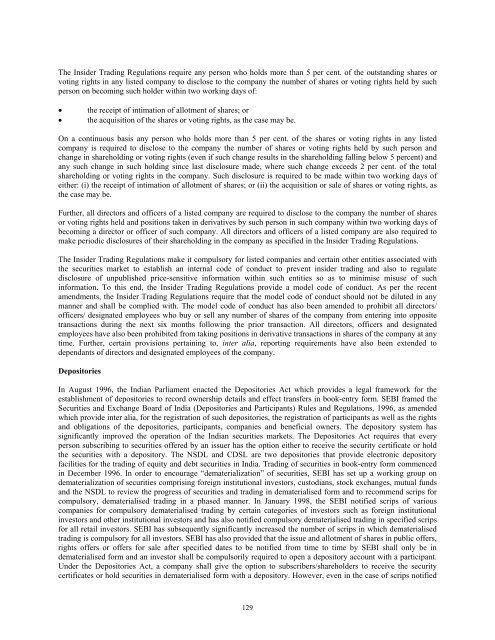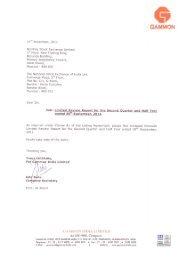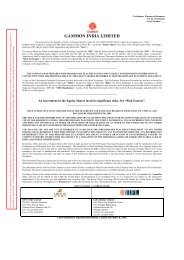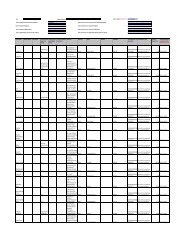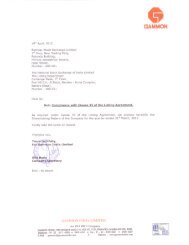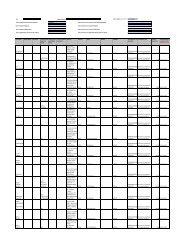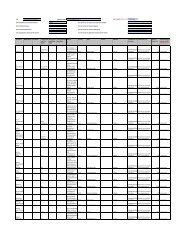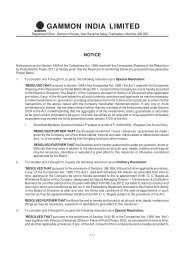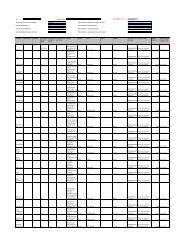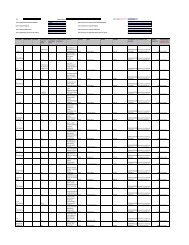GAMMON INDIA LIMITED
GAMMON INDIA LIMITED
GAMMON INDIA LIMITED
You also want an ePaper? Increase the reach of your titles
YUMPU automatically turns print PDFs into web optimized ePapers that Google loves.
The Insider Trading Regulations require any person who holds more than 5 per cent. of the outstanding shares or<br />
voting rights in any listed company to disclose to the company the number of shares or voting rights held by such<br />
person on becoming such holder within two working days of:<br />
the receipt of intimation of allotment of shares; or<br />
the acquisition of the shares or voting rights, as the case may be.<br />
On a continuous basis any person who holds more than 5 per cent. of the shares or voting rights in any listed<br />
company is required to disclose to the company the number of shares or voting rights held by such person and<br />
change in shareholding or voting rights (even if such change results in the shareholding falling below 5 percent) and<br />
any such change in such holding since last disclosure made, where such change exceeds 2 per cent. of the total<br />
shareholding or voting rights in the company. Such disclosure is required to be made within two working days of<br />
either: (i) the receipt of intimation of allotment of shares; or (ii) the acquisition or sale of shares or voting rights, as<br />
the case may be.<br />
Further, all directors and officers of a listed company are required to disclose to the company the number of shares<br />
or voting rights held and positions taken in derivatives by such person in such company within two working days of<br />
becoming a director or officer of such company. All directors and officers of a listed company are also required to<br />
make periodic disclosures of their shareholding in the company as specified in the Insider Trading Regulations.<br />
The Insider Trading Regulations make it compulsory for listed companies and certain other entities associated with<br />
the securities market to establish an internal code of conduct to prevent insider trading and also to regulate<br />
disclosure of unpublished price-sensitive information within such entities so as to minimise misuse of such<br />
information. To this end, the Insider Trading Regulations provide a model code of conduct. As per the recent<br />
amendments, the Insider Trading Regulations require that the model code of conduct should not be diluted in any<br />
manner and shall be complied with. The model code of conduct has also been amended to prohibit all directors/<br />
officers/ designated employees who buy or sell any number of shares of the company from entering into opposite<br />
transactions during the next six months following the prior transaction. All directors, officers and designated<br />
employees have also been prohibited from taking positions in derivative transactions in shares of the company at any<br />
time. Further, certain provisions pertaining to, inter alia, reporting requirements have also been extended to<br />
dependants of directors and designated employees of the company.<br />
Depositories<br />
In August 1996, the Indian Parliament enacted the Depositories Act which provides a legal framework for the<br />
establishment of depositories to record ownership details and effect transfers in book-entry form. SEBI framed the<br />
Securities and Exchange Board of India (Depositories and Participants) Rules and Regulations, 1996, as amended<br />
which provide inter alia, for the registration of such depositories, the registration of participants as well as the rights<br />
and obligations of the depositories, participants, companies and beneficial owners. The depository system has<br />
significantly improved the operation of the Indian securities markets. The Depositories Act requires that every<br />
person subscribing to securities offered by an issuer has the option either to receive the security certificate or hold<br />
the securities with a depository. The NSDL and CDSL are two depositories that provide electronic depository<br />
facilities for the trading of equity and debt securities in India. Trading of securities in book-entry form commenced<br />
in December 1996. In order to encourage “dematerialization” of securities, SEBI has set up a working group on<br />
dematerialization of securities comprising foreign institutional investors, custodians, stock exchanges, mutual funds<br />
and the NSDL to review the progress of securities and trading in dematerialised form and to recommend scrips for<br />
compulsory, dematerialised trading in a phased manner. In January 1998, the SEBI notified scrips of various<br />
companies for compulsory dematerialised trading by certain categories of investors such as foreign institutional<br />
investors and other institutional investors and has also notified compulsory dematerialised trading in specified scrips<br />
for all retail investors. SEBI has subsequently significantly increased the number of scrips in which dematerialised<br />
trading is compulsory for all investors. SEBI has also provided that the issue and allotment of shares in public offers,<br />
rights offers or offers for sale after specified dates to be notified from time to time by SEBI shall only be in<br />
dematerialised form and an investor shall be compulsorily required to open a depository account with a participant.<br />
Under the Depositories Act, a company shall give the option to subscribers/shareholders to receive the security<br />
certificates or hold securities in dematerialised form with a depository. However, even in the case of scrips notified<br />
129


